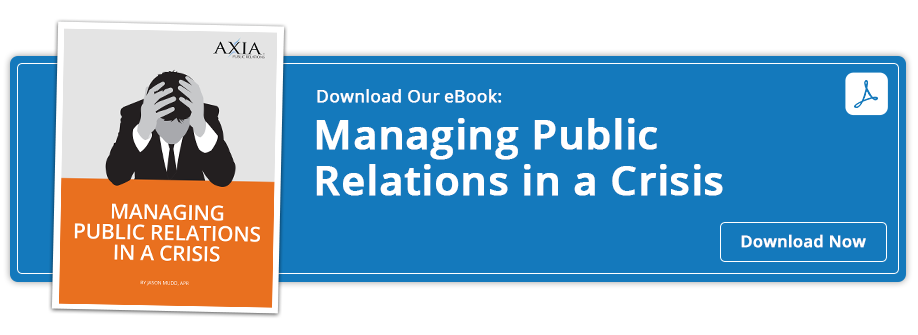 How a media policy can help you in a crisis
How a media policy can help you in a crisis
Imagine that your company is in the midst of a crisis. Perhaps your product caused an injury, you’re being sued, someone made a thoughtless comment publicly or a well-meaning campaign has gone horribly wrong. The news media is banging on the door and relentlessly calling every number at your company demanding a comment from someone – anyone. Would everyone in your organization know how to respond? Is it possible that someone might say the wrong thing, prolonging the problem and making the crisis even worse?
Unfortunately, this scenario is all too common and even if it hasn’t happened to your company yet, you need to be prepared for when it does. This is just one of the reasons why it’s crucial for you to have a PR professional develop a media policy for your company.
The benefits of a media policy
When everyone is rowing in the same direction, it’s less likely that your boat will tip over. Having a formal media policy – in writing – will ensure that all of your employees know what to do in the event of any media inquiry.
It doesn’t have to be a crisis. Journalists may call to discuss good news, to write a profile of your company or CEO or to request your help with expertise or background for an article. No matter when or why they call, it’s important that anyone who might answer the phone or greet them at the door knows the proper protocol.
A policy can also help to expedite your media relations efforts. When reporters and your employees both know whom to call, it will eliminate the need to bounce calls around, looking for the right person. This will improve your relationships with media.
What should your media policy include?
-
Information on who is authorized to speak to the media
You must have a designated spokesperson who is responsible for handling all media inquiries. In addition, having only a few people who can speak to the media allows you to control your messages and ensure they are coordinated and consistent.
-
Protocol for media inquiries
Staff should know to direct all reporter requests to your spokesperson quickly and courteously. They should also avoid adding comments or information which could be misconstrued as an official statement. For example, staff should not say, “You can speak to our spokesperson, but I don’t know why you’re calling about this issue. It’s not a big deal.” This can be detrimental if you’re currently crafting an official response which reads, “We are taking this issue very seriously.”
-
Procedures for reporting information
Your employees may be aware of an issue that could attract media attention. The policy should explain the right methods for informing senior management before the situation becomes public.
-
Specific categories of contact and how they should be handled
Not all media inquiries are created equal. For example, if there’s a legal issue, your attorney may be involved, or you may want to put a crisis communications team in place for emergency situations or disasters.
How a PR firm can help
At Axia, we can create a media policy designed specifically for your organization. Our expertise in dealing with media on a daily basis can be instrumental when developing media protocols. Contact us today or download our Managing Public Relations in a Crisis e-book.
Lisa Goldsberry is a writer for Axia Public Relations with more than 15 years of public relations experience. She specializes in business, higher education and technology PR. Connect with Axia Public Relations on Twitter @axiapr.
Featured image credit: 123rf.com
Topics: public relations, crisis communications



Comment on This Article